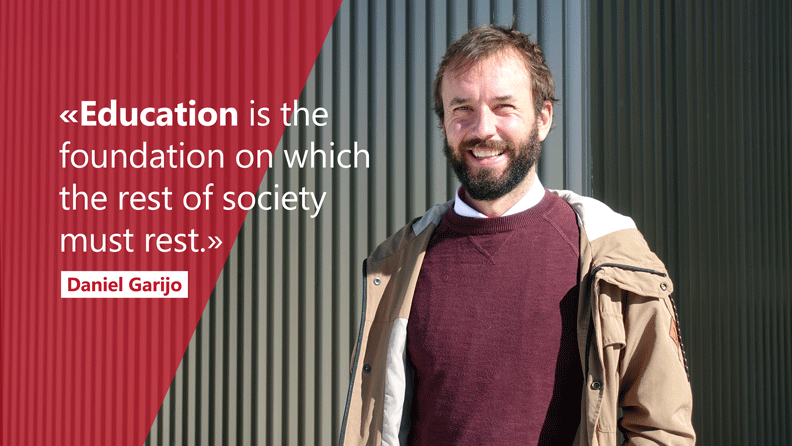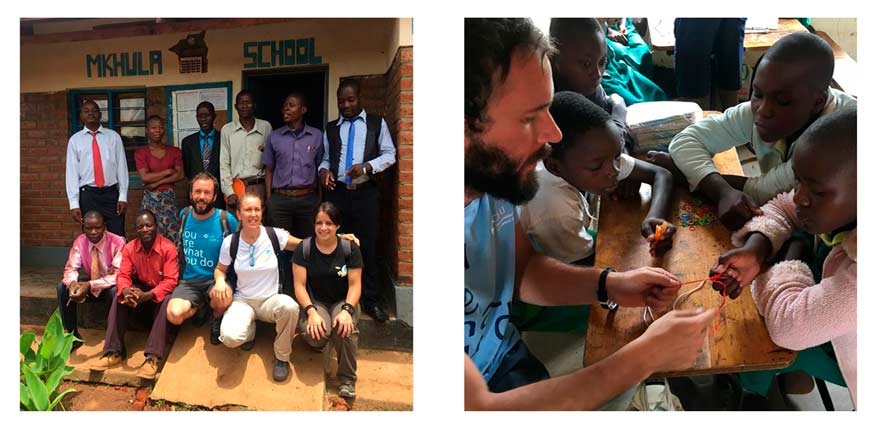The United Nations leaves no room for doubt as to its view. Its answer to the question “Can education enable people to gain better jobs and enjoy a better life?” is clear: “Yes, education reduces inequality.” And it also encourages tolerance, peace, and development. That’s why improving education in Africa is so important: it can be the means for millions of people to escape the cycle of poverty.
And when we say millions, how about 444 million people? That’s the number of children between 3 and 15 years of age who will need schooling in Sub-Saharan Africa in 2030.
Daniel Garijo is a teacher at CEU UCH’s Language Service and, for some years now, he’s also taken part in CEU UCH’s volunteering programme Vets for Africa, which is organized by staff at the Faculty of Veterinary Medicine. The aim of this international initiative is to improve the quality of life of those living in rural areas of Malawi and Kenya, via a holistic approach: working on nutrition, farming practices and, of course, education.
We’d like to give our sincere thanks to Daniel for spending some time with us to talk about this initiative, which is as wonderful as it is sorely needed. Our talk ranged widely over the issues of truancy, the lack of resources and the social stigmas which can hold children’s education back, while also putting the focus on the fundamental role played by teachers, our colleagues in Africa, in the day-to-day endeavour to improve education in their countries.
The Vets for Africa programme is mainly about the implementation of programmes related to veterinary issues, but it also aims to support schools in the same areas. Tell us about your first impressions of Malawi.
The large number of pupils, around two thousand, took me aback, as did the number of available classrooms – only ten. They face all kinds of challenges every day. Truancy, the lack of opportunities, but also the feeling that, no matter how hard the children try, their fate is already set. For the teachers too, it’s a very difficult situation and I admire them because, despite everything, they find the motivation every day to get up in front of the class and smile, even though they know that change will be a long time coming.
What kind of activities have you been taken part in with the teachers and pupils?
Bearing in mind that we’re not there for very long, in relative terms, we try to put on new kinds of activities and focus on skills that, due to a lack of resources, amongst other reasons, tend to get passed over. For example, we put songs on in English to do exercises to improve their listening skills – that has the advantage of combining the novelty factor with music, which they love. By doing this, we can get them to really make an effort and turn it into an experience which, together with the more theoretical content, they won’t easily forget.
We also look to make that same emotional impact using other materials, such as by getting them to play games with cardboard cut-outs, bits of string and decorative materials during arts and crafts sessions, etc. Of course, we leave all the resources there so that, when we’re not there, the teacher can also keep doing these dynamic and interactive activities, which enable you, to some extent, to get all the students involved and keep their motivation levels high.

Every year is different and you see that progress is being made, mainly thanks to the community who’ve been working there for years. Personally, I recall a lot of mixed feelings: the first year you feel powerless and you want to change everything as quickly as possible; later, you realize that you have to adapt to their rhythm and that’s it’s better to take things step by step.
What new things would you like to do for future trips out there?
I think that one of the best things we’ve done was to provide a schoolgirl with a scholarship (the situation for girls is especially difficult) so that she could continue with her secondary education. The first year that went to Teleza, but I wish we could offer many more. Although you’re only helping one person, the impact on that person’s life can be huge. It’d also be really great to take Education undergraduates from the University out there – it’s something we’ve been thinking about for a while!
ACCORDING TO THE UN, 617 MILLION YOUNG PEOPLE ACROSS THE WORLD LACK BASIC LITERACY SKILLS
Education is the foundation on which the rest of society must rest. That’s something I heard from someone (who’s a role model for me) who’s spent more than 20 years in Africa, a life’s work. To be able to take materials out there and help them to make their projects a reality is great and very rewarding, but it’s rather short-lived. I think the key, in the long term, is for the people there to be able to put their own ideas into practice, so that they can achieve real social and economic development. That’s the reason why education is so important.
That’s also why the Veterinary lecturers who take part in the project devote much of their time and effort to the training of the local people.
What personal experiences do you particularly value from taking part in this volunteering project? Would you encourage other colleagues and students to learn more and join in?
For as long as I can go and I’m allowed to go, I will. For me, it’s become a kind of annual therapy that enables me to put my own life and personal relationships in their proper context. I try not to complain so much. And I’m also really looking forward to seeing the children at the school again. I’d absolutely recommend the experience. Everyone who takes part, both staff and students, always talk about how rewarding the experience is for them.

In fact, if someone is interested in supporting the project, but can’t travel out there, there are several other ways to do that. For example, we have an “Adopt a goat” initiative, with the aim being to improve the nutrition and food safety of the people out there.
The University organizes a wide range of volunteering activities programmes in different places, both for local people and in other countries. If you’ve read this far, we’d like to invite you to learn more about them and find out about how you and everyone can contribute to making the world a more sustainable and fairer place.








